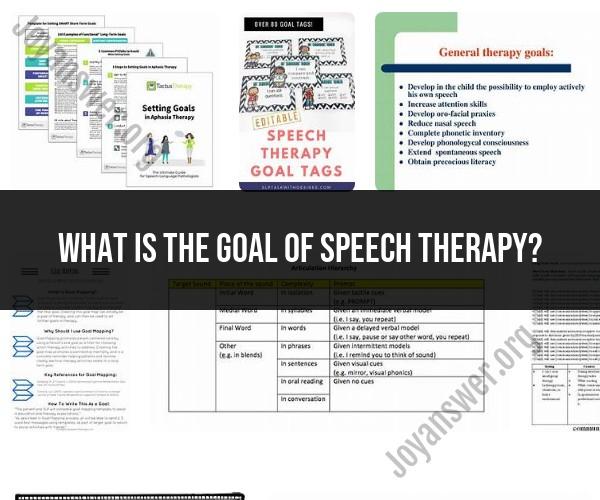What is the goal of speech therapy?
The goal of speech therapy, also known as speech-language therapy or speech-language pathology, is to assess, diagnose, and treat speech, language, communication, and swallowing disorders in individuals of all ages. The specific objectives and goals of speech therapy can vary depending on the needs and abilities of the client, but they generally encompass the following key areas:
Improving Communication Skills:
- One of the primary goals of speech therapy is to help individuals improve their communication skills. This includes enhancing their ability to express themselves clearly and effectively, both verbally and nonverbally.
Correcting Speech Sound Disorders:
- For individuals with articulation or phonological disorders, the goal is to help them produce speech sounds correctly. This involves addressing issues like mispronunciations, lisps, or difficulty with specific speech sounds.
Enhancing Language Skills:
- Speech therapists work on improving language skills, including vocabulary, grammar, syntax, and semantics. They help individuals develop age-appropriate language abilities for effective communication.
Stuttering Management:
- For individuals who stutter, speech therapy aims to reduce stuttering frequency and severity while improving overall fluency. Techniques like controlled breathing and speech rate adjustments may be employed.
Aiding Swallowing and Feeding:
- In cases of dysphagia (difficulty swallowing), speech therapy focuses on enhancing safe and efficient swallowing abilities, which can help prevent choking or aspiration. It may also address feeding difficulties in children.
Building Social Communication Skills:
- Speech therapists work with individuals to develop social communication skills, including understanding nonverbal cues, maintaining appropriate eye contact, and engaging in conversation with peers.
Facilitating Alternative Communication:
- For individuals who have severe communication impairments and cannot rely solely on verbal communication, speech therapists may introduce alternative communication methods, such as sign language, augmentative and alternative communication (AAC) devices, or communication boards.
Supporting Cognitive-Communication Skills:
- In cases where speech and language difficulties are associated with cognitive conditions (e.g., stroke, traumatic brain injury), speech therapy helps individuals regain and enhance their cognitive-communication abilities.
Promoting Literacy Skills:
- Speech therapists often play a role in promoting literacy by working on pre-literacy and literacy skills, including phonological awareness, reading comprehension, and writing.
Customized Treatment Plans:
- Speech therapists create individualized treatment plans tailored to the specific needs and abilities of each client. These plans may involve a combination of exercises, activities, and techniques to achieve communication goals.
Family and Caregiver Training:
- Speech therapy often includes educating family members and caregivers on how to support and reinforce the client's progress at home and in everyday life.
Functional Independence:
- The ultimate goal of speech therapy is to help individuals achieve functional independence in their daily communication and interaction with others, allowing them to participate fully in social, academic, and vocational activities.
Speech therapy is a highly specialized field that addresses a wide range of communication and swallowing challenges. The objectives and goals of therapy are tailored to each individual's unique needs, with the overarching aim of improving their overall quality of life through effective communication and safe swallowing.
The Goal of Speech Therapy: Enhancing Communication
The goal of speech therapy is to enhance communication. Speech therapists work with people of all ages who have a variety of communication disorders. These disorders can affect speech, language, and cognitive-communication skills.
Speech therapists use a variety of methods to help their clients improve their communication skills. They may work on improving articulation, pronunciation, fluency, and voice quality. They may also work on improving vocabulary, grammar, and sentence structure. In addition, speech therapists may work on improving cognitive-communication skills, such as problem-solving and decision-making.
Speech Therapy Objectives: Achieving the Ultimate Goal
Speech therapy objectives are specific goals that are developed for each individual client. The objectives are based on the client's specific communication needs and goals.
Speech therapy objectives are typically written in measurable terms. This means that they should be specific, measurable, achievable, relevant, and time-bound. For example, a speech therapy objective for a child with a speech disorder might be: "The child will produce the /s/ sound at the beginning of words with 80% accuracy in 3 out of 4 consecutive sessions."
Speech therapy objectives are important because they help to ensure that the client is making progress towards their ultimate goal of improved communication.
Speech Improvement: Understanding the Purpose of Therapy
Speech improvement is the process of making changes to one's speech in order to make it more clear, understandable, and effective. Speech improvement can be beneficial for people of all ages, but it is especially important for children who are learning to speak and for adults who have suffered a stroke or other brain injury.
Speech therapy can be a very effective way to improve speech. Speech therapists can help to identify the specific areas where improvement is needed and can develop a treatment plan to address those areas. Speech therapy can also help to develop new communication strategies and to build confidence in speaking.
If you are interested in improving your speech, there are a number of things you can do. You can talk to your doctor about getting a referral to a speech therapist. You can also find resources online and in your community to help you improve your speech.
Here are some additional tips for improving speech:
- Practice speaking slowly and clearly.
- Pay attention to your articulation and pronunciation.
- Avoid using filler words, such as "um" and "like."
- Make eye contact with the person you are speaking to.
- Use gestures and facial expressions to help communicate your message.
Improving speech takes time and effort, but it is a worthwhile goal. By improving your speech, you can communicate more effectively and confidently in all areas of your life.












